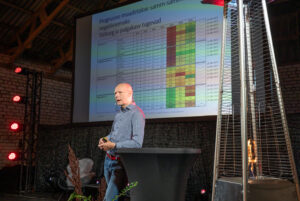The eleventh real estate seminar From Makers to Makers took place on 15–16 September at Pihlaka Farm in Peetri. Prominent figures in the real estate sector took to the stage with market insights and future prospects, stories from the past and useful tips. Almost everyone on stage predicts that difficult market conditions will persist for some time. However, the future is still optimistic, as the real estate market is primarily controlled by experts who are financially strong and make calculated decisions, and the employment rate remains high
According to CEO of Everaus Kinnisvara Janar Muttik, the current market situation is usually compared to the previous real estate boom. ‘Indeed the market has experienced a decline and is expected to remain subdued for a while, however, the bottom has been reached for now,’ explained Muttik. According to Muttik, the commercial property sector has been more affected by the high interest rate, where interest costs exceed rental yields, but in the residential property sector, home buyers are adjusting to the changed interest rate.
‘The market experienced a downfall in September last year and we did not manage to sell any units until the end of March, but starting from April there has been a resurgence in buying interest,’ Muttik said. Muttik suggests that rental investors remain relatively inactive at present and the level of transaction activity is not expected to reach what it was two years ago. However, prospective home buyers continue to show interest in purchasing homes. Buying a home is a long-term investment and temporary market fluctuations do not have much impact on purchase decisions. The premium home buyer has not disappeared from the market either.
When discussing property prices, Muttik remarked that they are highly influenced by the development phase and the extent to which people are willing to offer various promotions or discounts. However, in a situation where input costs are increasing, property prices cannot decrease. ‘Construction prices may be falling, but labour costs are rising faster. Therefore, I dare to say that by next summer it will no longer be possible to buy a home at today’s price’ added Muttik.
‘You often hear statements along the lines of – the developer must always be optimistic about the market situation. It’s not always so, but in the case of Everaus Kinnisvara, if pre-sales have been strong and there has not been any pricing pressure, there is no reason to complain either. Yes, in a market downturn you have to work much harder to secure sales and optimise costs, but this is just the natural way of doing business. Promotions that offer a storage unit, parking space or kitchen furniture in addition to the purchase are also quite common in the sector and marginal compared with property prices.’
Investors are waiting for the right time
According to investor and promoter of financial wisdom Jaak Roosaare, investors are currently waiting for the right time. ‘If we talk about nominal prices, these have not fallen very much. We have had high inflation for a long time, and if real estate prices remain at current levels, real prices will slowly go down,’ Roosaare says.
According to Roosaare, investors are considering other ways to invest their money besides buying a rental flat: ‘People who used to buy rental flats now wonder why they should invest, only to get a 6–7% return while having to manage the property as well. They would rather give out loans at a 8–12% interest rate and go travelling, not having to worry about property management or decreasing real estate prices.’ According to Roosaare, this is why more money has moved into the lending business, and this can be seen in the way banks are issuing bonds.

‘In hindsight, the interim period was too good to be true,’ said Roosaare, referring to the situation where some developments were sold out before the building permit even arrived, ‘The new reality is that you only start with projects where 40–60% of the units are sold out in advance, and you are sure that you can pay off your bank loan. In order to keep some plots in your portfolio, you need to have a broader capital base and investor support.”
According to Roosaare, investors are currently in a favourable position with a more available options compared to a few years ago: ‘During prosperous times, developers were hesitant to share their capital with others and were inclined to rely on both secured and unsecured loans. However, in the present, developers are more receptive to attracting investors for the equity component.’
The number of real estate transactions is declining
‘Compared to the past, the forecasts have increasingly shifted towards a negative outlook,’ stated Tõnu Toompark, an instructor and consultant at the Real Estate School. Toompark believes that the toughest times are either already here or imminent, but he emphasises that the current situation cannot be directly compared to the previous crisis, and the labour market remains robust. ‘There will certainly be more foreclosures than there have been in the last 10 years, but there are no signs of any major problems with loan repayments,’ Toompark is optimistic.

According to Toompark, sales are high at the moment, but this is due to the completion of apartments that were sold in advance, and this wave is also starting to pass. ‘Looking ahead, it is more than likely that the number of transactions will decrease by half,’ Toompark is convinced. Toompark suggests that there is no need for alarm, and the market is functioning as it should. However, transactions are limited by a combination of low consumer confidence and elevated prices.
As indicated by Mihkel Eliste, a real estate analyst and appraiser at Arco Vara, the decline in consumer confidence is also impacting transaction volumes. Eliste pointed out that the number of viewings per property has dropped significantly and the share of legal entities in sales has decreased.
The interest rate is keeping purchasing power low,’ Toompark explained, ‘I don’t foresee any possibility for transaction numbers to remain at their current level because buyers are facing challenges in financing their real estate purchases.’ According to Eliste, fewer loans are being secured for real estate purchases this year due to concerns related to Euribor, expensive borrowing, and decreased credit availability.



